新概念英语第二册39课
新概念英语第二册39课

1、人称的转变
1)直接引语中的第一人称随主句主语变 如: He said,“I am very sorry.” ——>He said that he was very sorry. 2)直接引语中的第二人称随主句谓语变 如: “You should be more careful next time,” my father told me. ——> My father told me that I should be more careful the next time.
2、时态的转换 直接引语改为间接引语时,主句中的谓语动词 如果是过去时,从句(即间接引语部分)的谓语动词在时态方 面要作相应的变化,变成过去时范畴的各种时态(实际也是宾 语从句的时态要求),变化如下:
直接引语 间接引语 一般现在时 一般过去时 一般过去时 过去完成时 现在进行时 过去进行时 现在完成时 过去完成时 过去完成时 过去完成时 过去进行时 过去进行时 一般将来时 过去将来时
3)地点状语:here变成there She said, “I won't come here any more.” ——> She said that she wouldn’t go there any more. 4)动词:come变成go,bring变成take 5、直接引语变间接引语,句子结构的变化 1)陈述句。用连词that引导,that在口语中常省略。主 句的谓语动词可直用接引语中的said, 也可用told来代替, 注意,可以说said that, said to sb. that, told sb. that, 不可直接说told that,
如: He asked me, “Will you go to the station with me to meet a friend of mine this afternoon?”
新概念英语第二册Lesson39AmIallright?(课文详解练习)讲义

新概念英语第二册Lesson 39Am I all right? 我是否痊愈?While John Gilbert was in hospital, he asked his doctor to tell him whether his operation had been successful, but the doctor refused to do so. The following day, the patient asked for a bedside telephone. When he was alone, he telephoned the hospital exchange and asked for Doctor Millington. When the doctor answered the phone, Mr. Gilbert said he was inquiring about a certain patient, a Mr. John Gilbert. He asked if Mr. Gilberts operation had been successful and the doctor told him that it had been. He then asked when Mr. Gilbert would be allowed to go home and the doctor told him that he would have to stay in hosptial for another two weeks. Then Dr. Millington asked the caller if he was a relative of the patient. No, the【课文翻译】While John Gilbert was in hospital, he asked his doctor to tell him whether his operation had been successful, but the doctor refused to do so. 当约翰.吉尔伯特住院的时候,他问医生他的手术是否成功,但医生拒绝告诉他The following day, the patient asked for a bedside telephone. 第二天,这位病人要了一部床头电话。
新概念英语第二册课后练习题答案详解(第39课)

新概念英语第二册课后练习题答案详解(第39课)新概念英语第二册课后习题 Lesson 391. d根据课文描述的情况只有d. to find out about hisoperation(查出他手术的情况)是John Gilbert wanted a bedside telephone(约翰·吉尔伯特要床头电话)的真正目的,而其他3个选择都不是他要床头电话的目的,所以选d.2. a根据课文第10行Then Dr. Millington asked the caller if he was a relative of the patient 能够看出,只有选a. was a relative of John Gilbert 才符合医生当时的心里猜测,而其他3个选择都不是医生当时想的,所以应该选a.3. c只有c. to 最合乎语法。
a. at , b. in , d. on 这3个介词都不合适。
4. da. say him不合乎语法,say后面应该加to,表示"对他说"b. tell to him 不合乎语法,tell后面应不带to,直接跟间接宾语him,意思是"告诉他"c. speak him 也把合乎语法,speak后面应该加to表示"对他讲",所以选d.5. d只有d.是最准确的疑问句What did he ask for? (他要求得到什么?) 回答是:A bedside telephone. a. For what did he ask 不合乎语法;b. what did he ask (他问了什么?) 后面缺少for, 意思就不同了;c. For what did he ask for 不合乎语法,前面不应该有for.6. a只有选a. let him go(让他走)才能同前一句When will he be allowed to go home(他什么时候能够回家。
Am I all right?我是否痊愈?-新概念英语第二册自学导读笔记第39课

Am I all right?我是否痊愈?-新概念英语第二册自学导读笔记第39课新概念英语第二册第39课课文重难点 further notes on the text1.am i all right?(标题)我是否痊愈?all right 在不同的上下文中会有不同的含义。
当指人的健康状况时,它能够表示"安然无恙的"、"良好的":i was not very well last week, but i feel all right now.我上星期有点不舒服,不过我现在觉得好了。
2.… he asked his doctor to tell him whether his operation had been successful, but the doctor refused to do so.……他问医生他的手术是否成功,但医生拒绝告诉他。
whether引导的从句在句中作动词 tell 的直接宾语,是一个间接一般疑问句。
(cf.本课语法)so在这里为代词,代替前面的动词不定式(在 to tell himwhether…)。
它一般出现 believe, do, expect, hope, say, tell, think, appear等之后:3.the following day, the patient asked for a bedside telephone. 第2天,这位病人要了一部床头电话。
(1)following 在这里相当于next,表示"紧接着的"、"其次的"。
(2)ask for 在这句话中表示"请求"、"要求(得到某个东西)";在下一句话(…asked for doctor millington)中它表示"要求(某人)来(接电话)"。
4.…mr.gilbert said he was inquiring about a certain patient ,a mr.john gilbert.……吉尔伯特先生说他想询问一个病人的情况,是一位名叫约翰·吉尔伯特的先生。
新概念英语第二册Lesson39课件共17张PPT

NCE II L39
New words and expressions
operation 手术
[ˌɒpəˈreɪʃn] n.
The doctor advised an immediate operation . operate vi. (对…)动手术
Mr Gilbert’s operation had been successful and the doctor told him that it had been. He then asked when
Mr Gilbert w___o_u__l_d__b__e_(be) 10 allowed to go home and the doctor told him that he would have to _s_t_a__y_____
(stay) 11 in hospital for another two weeks. Then Dr. Millington asked the caller if he was a relative of the patient. “No,”the patient answered, “I am Mr John Gilbert.
New words and expressions
inquire 询问,打听
[ɪn'kwaɪə(r)] v.
inquire sth. of sb. 从某人那打听 inquire about sth./sb.
New words and expressions
certain adj. 某个
[ˈsɜ:tn]
新概念英语第二册Lesson 39 (PDF版课件 )
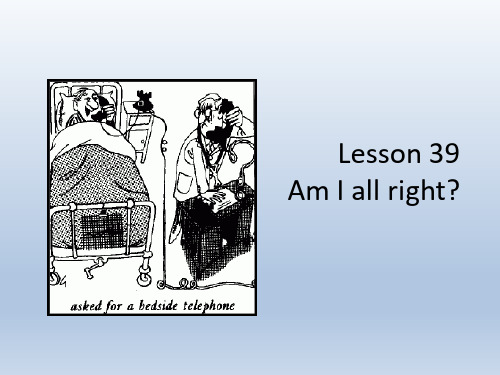
New words and expressions
• In exchange, you teach me how to clean.
GRAMMAR
Grammar
• 定义:当一个句子作宾语时,这个句子就 叫做宾语从句。
• 179 • 180页
Grammar
• 用法:在谓语动词、介词、动词不定式等 后面都可以接宾语从句。
Comprehension questions
• The doctor refused to, didn't he? • Yes, he did.
Comprehension questions
• What did the patient ask for the following day?
• For a bedside telephone.
• in hospital • 住院
Text
• The following day, the patient asked for a bedside telephone.
• asked for 请求,索要
Text
• He asked me for a meal and a glass of beer. • NCE2 Lesson6
operation n.
• the process of cutting into someone’s body to repair or remove a part that is damaged
• 手术
New words and expressions
• operation on • She’s going to need an operation on her ankle.
裕兴新概念英语第二册完美打印版笔记_第39课

Lesson 39 Am I all right? 我是否痊愈?单词operation n.手术operate V.1)操作,操纵(机器等),运作,运转( control,run) operate a machine操纵一台机器operate the lift开电梯例:This sewing machine doesn't operate properly.这台缝纫机不太好用了。
2)经营,管理(run, manage)operate a company经营一家公司例: The company operate ten factories.这家公司管理十个厂子。
The business operate in various counties.那家企业在许多国家都有业务。
3)动手术operate on sb for--为谁动手术例: The surgeon decided to operate on her for appendicitis(盲肠)promptly.这个外科医生决定立刻为她做盲肠手术physician 内科医生operation n.手术,运转,操作operation instruments 手术器械例:I had an operation on my heart../I underwent an operation on my heart.我做了一次心脏手术。
the operation of an old machine IH机器的运转bring into operation /put into operationvt.实施(法律,计划等),运作(机械等)come into operation V1.实施,开始运转例: The new rules will come into operation next month./The new rules will be put into operation next month. 新的规章制度下个月开始实施。
新概念英语第二册第39课课件
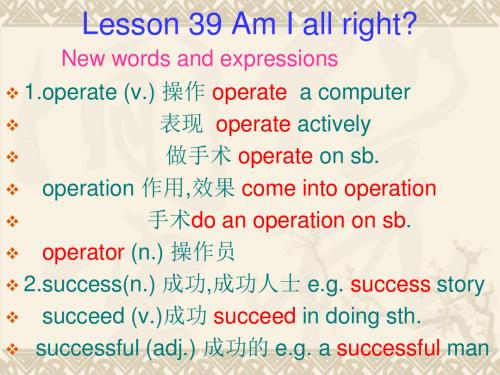
10.relative
(n.) 亲戚,亲属=relation close/distant relatives relationship (n.) 关系
Notes on the text
1.While
John Gilbert was in hospital, he asked his doctor to tell him whether his operation had been successful. be in hospital 住院 be in the hospital 在医院里 whether=if 2.The following day, the patient asked for a bedside telephone. the following day= the next day a bedside telephone 床头电话
alone (adj.) 单独的,独自的 be alone e.g. I’m alone at home today. lonely (adj.) 孤独的,寂寞的 e.g. feel lonely 6.exchange (v.) 调换,更换 exchange A for B e.g. exchange a red dress for a blue one 交换,互换 exchange seats exchange ideWhen
he was alone, he telephoned the Hospital Exchange and asked for Doctor Millington. the Hospital Exchange 医院的电话交换台 ask for sb. 要…接电话
4.a
新概念英语第二册课件Lesson39(共29页)
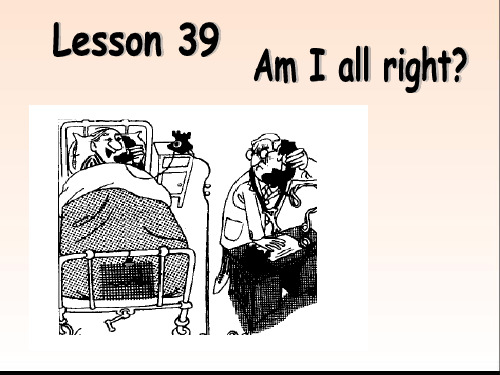
间接引语 then that day that night the next day the day before that week(month, year…)
the week(month, year…) before the next week(month, year ...) three days(months, years …) before
• reject to do sth.
• reject sth.
• refuse to do sth. • refuse sb.
• decline 委婉的拒绝 refuse politely • decline to do sth. • decline sb.
• 1.While John Gilbert was in hospital, he asked his doctor to tell him whether his operation had been successful, but the doctor refused to do so.
• vt.交换, 调换
They exchanged experience at the meeting. ask for: 要求,请求
• 4.When the doctor answered the phone, Mr. Gilbert said he was inquiring about a certain patient, a Mr. John Gilbert.
have a cold have a fever
toothache stomachache
have a headache
have a sore throat
裕兴新概念英语第二册笔记_第39课_课文讲解

TextWhile John Gilbert was in hospital, he asked his doctor to tell him whether his operation had been successful,but the doctor refused to do so. The following day, the patient asked for a bedside telephone. When he was alone, he telephoned the hospital exchange and asked for Doctor Millington. When the doctor answered the phone, Mr. Gilbert said he was inquiring about a certain patient, a Mr. John Gilbert. He asked if Mr. Gilbert's operation had been successful and the doctor told him that it had been. He then asked when Mr. Gilbert would be allowed to go home and the doctor told him that he would have to stay in hosptial for another two weeks. Then Dr.Millington asked the caller if he was a relative of the patient. 'No,' the patient answered, 'I am Mr. JohnGilbert.'While John Gilbert was in hospital, he asked his doctor to tell him whether hisoperation had been successful, but the doctor refused to do so.所问的原句是:“Was my operation successful?”while adj. 1adj当...的时候,和..同时,只要eg He took a bath while I was preparing dinner. 我在准备饭的时候,他洗了个澡。
新概念2第39课练习题答案.doc
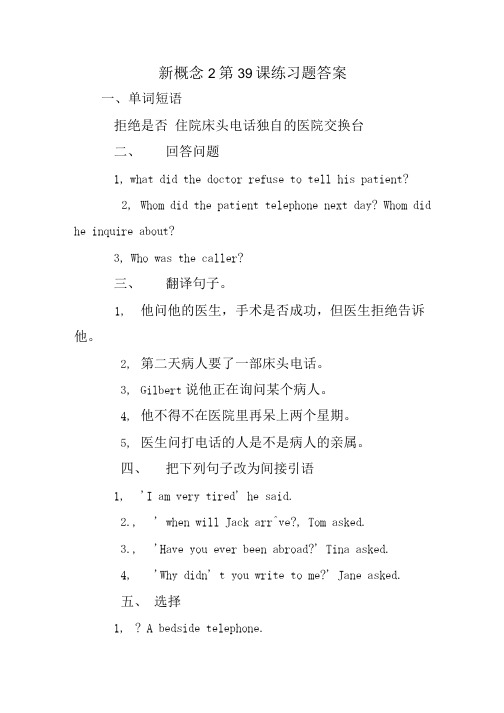
新概念2第39课练习题答案一、单词短语拒绝是否住院床头电话独自的医院交换台二、回答问题1,what did the doctor refuse to tell his patient?2,Whom did the patient telephone next day? Whom did he inquire about?3,Who was the caller?三、翻译句子。
1,他问他的医生,手术是否成功,但医生拒绝告诉他。
2,第二天病人要了一部床头电话。
3,Gilbert说他正在询问某个病人。
4,他不得不在医院里再呆上两个星期。
5,医生问打电话的人是不是病人的亲属。
四、把下列句子改为间接引语1,'I am very tired' he said.2.,' when will Jack arr^ve?, Tom asked.3.,'Have you ever been abroad?' Tina asked.4,'Why didn' t you write to me?' Jane asked.五、选择1,? A bedside telephone.A For what did he askB What did he askC For what did he ask forD What did he ask for2,I am going shopping now. I home soon.A returnB will be backC come backD go back, Thereis milk in the bottle.A notB anyC fewD no4,She asked meA where did I liveB where did you liveC where IlivedD I lived where5,I think chickens can swim,?A can' t theyB can theyC doesn' t itD do I新概念第二册25-39课练习%1.用careful, clear, quick, sad, slow 的正确副词形式填空1.I can?t always understand his letters. Hedoesn?t write very.2.The woman looked at me and shestarted to cry.3.Please pick up that box. There?s glass inside it.4.I?ve finished my homework in only twenty minutes. I?ve done is much morethan I usually do.5.The workers sometimes work quite so that they can earn more money.%1.从右侧选择出与左侧词组意思相对应的解释1.put awaya. move to a later date2.put downb. stand, tolerate3.put off c.get dressed in, cover body with4.put on d. construct or give someone a bed5.put out e. write down6.put up f. extinguish7.put up with g.put where something is usually kept用上面的词组填一下空格1.Have you ever tried to a tent ina strong wind?2.The firemen managed to the fire ina very short time.3.I think I?ll take off my heavy shoes and my sandals instead.4.Can you our friendsfor one night?5.She won?t the children?srudeness any longer.6.The students are what the teacherhas written on the board.7.The weather was so bad that we had to the football match till next week.8.I have just my booksI can?t get them out again.%1.选词填空1.The shopkeeper to serve the boy.2.If you know you?ve done something wrong, don?t3.Can you my newspaper from the other room?4.I?ll you the book you want when I cometo see you.5.He went to visit her in hospital and hersome flowers.6.Don?t forget to your umbrella with you.It might rain.7.I felt quite ill an hour ago. I?m worse now:I feel ill.8.?I?m ill to go to college today, ?the girl told her mother.%1.必要的地方添加冠词1.While he was in Europe, he visited_________ Italy,Germany,France,UK, and Netherlands.2.Amazon is the longest river in South America.3.Himalays are in Asia.4.Have you ever crossed Pacific orAtlantic?5.She has always wanted to visitUnited Kingdom and see Londonfrom a boat on Thames.2.The factory 500 people when my fatherworked there.3.He?s lucky. He?s just got a new at abank.4.Whenever I throw a stick for my dog, he will run and it.5.When he, my father had worked in the same firm for thirty years.6.?Don?t pay to have your watch mended, ? my friend said, ?I can it for you. ?7.You could a lot of money by using less electricity.8.When you come to see me, please yourcalculator with you.9.The little boy fell into the river and a young man dived in and him.10.on the new bridge has already begun. 六.介词选择1.Please don?t throw stones this notice.A. toB. onC. atD. in2.Everybody ran the building as the firespread.A.outB.out fromC.outsideD. out of3.The car came me very fast.A. toB. towardsC. atD. on4.The rabbit ran that hole and hasn?tcome out yet.A.toB. throughC. intoD.across5.Mr. Jackson flew New York on Friday.A. onB. forC. atD. to6.They are leaving France today.A. toB. forC. onD. at7.They flew London to New York on Concoede.A. ofB. forC. towardsD. from8.We the alarm clock rang, I jumped bed.A. ofB. outC. out ofD. for9.We always leave home o?clock every morning.A. atB. onC. inD. of10.I was born 1970.A, atB. on C. ofD. in11.Where do flies go winter.A. atB. ofC. onD. in2. Our teacher our names and we allanswered ?Present?3.Firemen fought for hours to the fire.4.On your way home, can you please the supermarket for some bread?5.You should a coat before you go out.It?s cold outside.6.I Susan for a short time yesterday and we listened to a new CD of hers.7.John was ill on his birthday so his mother just his party for a week instead ofcancelling it completely.8.We some friends at our housewhen whey were here last year..A.阅读理解I never saw my father home from work late or ill, nor did I ever see my father take a “night out with the boys" . He had no bobbies but just took care of his family. Foryears, since I left home for college, my father called me every Sunday at:00 am. He was always interested in my life-how my family was doing. The calls even came when he and my mother were in Australia, England or Florida.Nine years ago when I bought me first house, my father, years old, spent eight hours a day for three days, painting my house. He would not allow me to pay someone to have it done. All he asked, was a glass of iced tea, and that I hold a paintbrush for him and talk to him. But I was too busy, for I had a law practice to run, and I could not take the time to hold the paintbrush, or talk to my father.Five years ago, myl-year-old father spent five hours putting together a swing setfor my daughter. Again, all he asked was that I get him a glass of iced tea, and talk to him, But again, I had laundry to do, and the house to clean.The morning on Sunday, January 16, 1995, my father telephoned me as usual, this time he had seemed to haveforgotten some things we had discussed the week before. I had to get to church, and I cut the conversation short.The call came at:40 am. That day my father was sent to hospital in Florida. I got on a plane immediately, and I vowedthat when I arrived, I would make up for the lost time, and have a nice long talk with him ad really I arrived in Florida at 1:00 am, but my father had passed away at:1pm. This time it was he who did not have time to talk, or time to wait for me.In the years since his death I have learnt much about my father, and even more about every single day.66.We know from the reading that the father.A. liked to paint housesB. had no friendsaround himC. was not healthy in his youthD. thought of his family as his all67.When her father painted her first house, the daughter.A. could only afford a glass of iced teaB. was too busy to talk to her fatherC. could do nothing but hold a paintbrushD. spent eight hours a day working with her father68.On January 16, 1996, the daughter felt that herfather.A. seemed to be a little differentB. had no time to phone her as usualC. became interested in churchD. had forgotten to discuss some things with her69.In the reading the underlined phrase ?get to know him? most probably means.A. get him to know herB. know more about himC. get him to know himselfD. make him well-known70.Which is the best title of the reading?A. Painting HousesB. Daughter?, FamilyC. Father and ID. Father?s phone calls九.短文填空When you' re busy or stressed, don' t forget your hobbies, such as listening to, reading and play?ing ball games. If eating makes youbetter, you can go to your favourite restaurant toa delicious meal.Parents may not think that it is to watchTV., if you are worried your Englishand don' t know how to improve, why not watch some English TV programmes? If you' re feeling bad about your weight and don' t know to do, whynot go walking or jogging?Finally, trying to keep your worries to y ourself can make them worse. I like to share my problems with my friends. They always give me useful.If you don' t know who to talk to, you can always write me. You' re never alone.新概念英语二lesson46课后短语练习答案《新概念英语》第二册第46课第208页83个词组与to, at, for和with连用的动词与to 连用的动词:accustom to; amount to; appeal to; apply to /for; attach to; attend to; belong to;challenge to; compare to /with; condemn to; confess to;confine to; consent to; convert to) ; entitle to; listen to; mention to; object to; occur to; prefer to; reactto /against; reply to; respond to; see to; submit to;surrender to; turn to; yield to。
新概念英语第二册 Lesson 39课件

1. ____ John Gilbert was in hospital, he asked his doctor to tell him ____ his operation had been successful, ___ the doctor refused to do___.
2. The____ day, the patient asked for a ___ telephone.
imagination .
☆ alone 1) adj. 独自的,单独的(不能置于名词前) He likes being alone.
2) adv.独自地
I live alone. 我一个人住。
alone= one one’s own = by oneself 单独,独自
☆ inquire (enquire) v.询问,查询(比ask正式)
5. He then asked when Mr.Gilbert would __ __ ___to go home and the doctor told him that he would have to __ ___ __ for another two weeks.
6. They lington asked the caller if he was ___ ___ ___the patient.
be patient with sb 对某人有耐心 be patient of sth 对某事有耐心
Fill in the blanks.
•He’s a very __p_a_ti_e_n_t_-man . •Mr. scott stood ___p_a_t_ie_n_t_ly___at the bus stop. • The job needs of__p_a_t_ie_n_c_e__. •She was a lively young man with patience and
裕兴新概念英语第二册笔记第39课

Lesson 39 Am I all right? 我是否痊愈?Why did Mr. Gilbert telephone Dr. Millington?While John Gilbert was in hospital, he asked his doctor to tell him whether his operation had beensuccessful, but the doctor refused to do so. The following day, the patient asked for a bedside telephone. When he was alone, he telephoned the hospital exchange and asked for Doctor Millington.When the doctor answered the phone, Mr. Gilbert said he was inquiring about a certain patient, a Mr. John Gilbert. He asked if Mr. Gilbert's operation had been successful and the doctor told him that ithad been. He then asked when Mr. Gilbert would be allowed to go home and the doctor told him thathe would have to stay in hospital for another two weeks. Then Dr. Millington asked the caller if he wasa relative of the patient. 'No,' the patient answered, 'I am Mr. John Gilbert.'参考译文当约翰.吉尔伯特住院的时候,他问医生他的手术是否成功,但医生拒绝告诉他。
新概念英语二册第39课精品课件

operate vi. (对…)动手术 operate on sb v.运转; 操作;经营
The doctor decided to operate on her immediately.
successful adj. 成功的
他是个成功的商人。 He is a successful businessman. success n. 成功
Text
While John Gilbert was in hospital, he asked his doctor to tell him whether his operation had been successful, but the doctor refused to do so.
so是代词,指代的是前面的动词不 定式 to tell...
成功源于自信。 Confidence leads to success. succeed v. 成功 succeed in doing sth
她在科学领域取得了巨大成功。 She succeeds greatly in science.
新概念英语第2册课程讲义Lesson39

Lesson 39 单词讲解1. operation n. 手术have an operationn. 操作,运转,经营business operationn. 行动rescue operationmilitary operation2. successful adj. 成功的successfully adv.success n.succeed v.3. alone adj. 独自的adv.lonely adj. 偏僻的,人迹罕至的,孤单寂寞的The old lady lived _______, so she felt _______.Leave me alone!Lesson 39 课文&语法讲解Key points: 直接引语变间接引语(宾语从句)他说:“我是笨蛋。
”直接引语他说我是笨蛋。
他说他是笨蛋。
间接引语He says, “I am a fool.”直接引语He says ________________ . 间接引语•直接引语变间接引语1. 引号打开变宾语从句看引号中的句子类型2. 设身处地转换角度–人称–时态–代词或状语等•宾语从句1. He will help us.2. What did you say?3. Is she coming here?We know ________________________.•直接引语变间接引语1. 引号打开变宾语从句看引号中的句子类型2. 设身处地转换角度–人称–时态–代词或状语等直接引语变间接引语(宾语从句)“I am inquiring a certain patient ...”Mr. Gilbert said _____________________________________.直接引语变间接引语(宾语从句)“When will Mr. Gilbert be allowed to go home? ”He then asked直接引语变间接引语(宾语从句)“Was my operation successful ? ”He asked his doctor to tell him______________________________________.1. … he asked his doctor to tell him whether his operation had been successful …2. … Mr. Gilbert said (that) he was inquiring a … patient …3. He asked if Mr. Gilbert’s operation had been successful …4. … the doctor told him that it had been (successful).5. He then asked when Mr. Gilbert would be allowed to go home …6. … the doctor told him that he would have to stay in hospital for another two weeks.7. Then Dr. Millington asked the caller if he was a relative of the patient.Lesson 39 知识拓展Key points:直接引语变成间接引语(宾语从句)复习宾语从句写法:①陈述句变宾语从句?复习宾语从句写法:①陈述句变宾语从句?You are right.I know __________________.复习宾语从句写法:②特殊疑问句变宾语从句?What will she say?I know __________________.复习宾语从句写法:③一般疑问句变宾语从句?Is he happy?I know ________________________.复习宾语从句写法:①I know that you are right.②I know what she will say.③I know whether he is happy.练习宾语从句•我承诺我会帮助你。
新概念英语第二册第39课(共39张PPT)
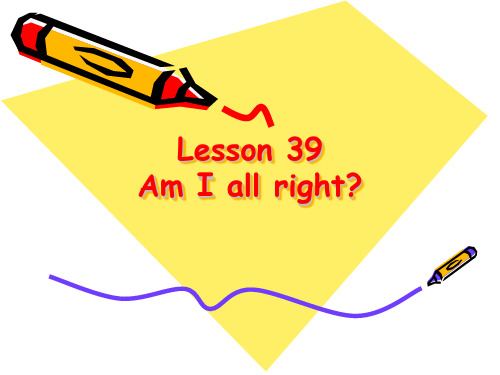
e.g operate the lift 2) 经营,管理 = run, manage e.g operate a company 3) operate on sb for… 因…而给…做手术
relationship [ri'leiʃənʃip] n.关系, 联系
While John Gilbert was in hospital, he asked his doctor to tell him whether his operation had been successful, but the doctor refused to do so. The following day, the patient asked for a bedside telephone. When he was alone, he telephoned the hospital exchange and asked for Doctor Millington. When the doctor answered the phone, Mr. Gilbert said he was inquiring about a certain patient, a Mr. John Gilbert. He asked if Mr. Gilbert's operation had been successful and the doctor told him that it had been. He then asked when Mr. Gilbert would be allowed to go home and the doctor told him that he would have to stay in hospital for another two weeks. Then Dr. Millington asked the caller if he was a relative of the patient. 'No,' the patient answered, 'I am Mr. John Gilbert.'
- 1、下载文档前请自行甄别文档内容的完整性,平台不提供额外的编辑、内容补充、找答案等附加服务。
- 2、"仅部分预览"的文档,不可在线预览部分如存在完整性等问题,可反馈申请退款(可完整预览的文档不适用该条件!)。
- 3、如文档侵犯您的权益,请联系客服反馈,我们会尽快为您处理(人工客服工作时间:9:00-18:30)。
如: Our teacher said to us, “Light travels faster than sound.” ——> Our teacher told us that light travels faster
than sound.
6)当引语是谚语、格言时,
示过去的时间时,
如: He said,“When I was a child, I usually played
football after school.”
——> He said that when he was a child, he usually
played football after school.
alone with 与…一起
Exchange vt.1. 换,更换,调换,掉换:
Most store will allow the customers to exchange their goods.
大多数商店将允许顾客更换商品。 2. 换回,换来,换取 3. 把…换成;用…交换;兑换(for)
变化要因实际情况而定,不能机械照搬,如果当地转述,
3)地点状语:here变成there
She said, “I won't come here any more.”
——> She said that she wouldn’t go there any more.
4)动词:come变成go,bring变成take 5、直接引语变间接引语,句子结构的变化 1)陈述句。用连词that引导,that在口语中常省略。主 注意,可以说said that, said to sb. that, told sb. that, 不可直接说told that,
3、直接引语变成间接引语时,从句时态无
须改变的情况
1)当主句的谓语动词是一般现在时的时候, 如: He always says, “I am tired out.” ——>He always says that he is tired out. 2)当主句的谓语动词是将来时的时候,
如: He will say, “I’ll try my best to help you.”
——> He told us that he would give us an examination
the next Monday.(不可说told that) 2)直接引语为一般疑问句,(也称是否疑问句,)间接 引语用连词whether或if引导,原主句中谓语动词said要 改为asked(me/him/us等),语序是陈述句的语序,这
Patient
adj.1. 忍耐的;容忍的
2. 坚忍的;耐心的 3. 沉着的;不急躁的 4. 耐心等待的;显出有耐心的 5. 勤快的;孜孜不倦的 n. 1.病人;患者 2. 受动着;承受者
Phrases: patient of 能忍受 patient with 对……有耐心 patient care 病患照顾
一点非常重要。
如: He said, “Do you have any difficulty with pronunciation?”
——>He asked(me)whether/if I had any difficulty
with my pronunciation.
3) 直接引语为选择疑问句,间接引语用
——>He will say that he will try his best to help me.
3)当直接引语部分带有具体的过去时间状语时
如: He said, “I went to college in 1994.” ——>He told us that he went to college in 1994. 4)当直接引语中有以when, while引导的从句,表
whether…or…表达,而不用if…or…,也不用
either…or….
如: He asked, “Do you speak English or French?”
——> He asked me whether I spoke English or French.
4)直接引语为特殊疑问句,改成间接引语时,原来 的疑问词作为间接引语的连词,主句的谓语动词用 ask(sb.)来表达,语序改为陈述句语序。
to, need时
如:She asked, “Must I take the medicine?”
——> She asked if she had to take the medicine.
„注‟:此处用had to代替must更好 8)此外转述中的 here不必改为there, 动词come不必改为go,如果当天转 述yesterday, tomorrow, this afternoon等均不必改变。
mental patient 精神病人
alone adj. 1. 孤零的,孤单的 2. 单独的;孤独的 adv. 1. 孤零地,孤单地,孤独地 2. 单独地 3. 独自地;孤立无援地 4. 只,只有;仅仅
Phrases:
let alone 更不必说;听任;不打扰 stand alone 孤立;独一无二
2、时态的转换 直接引语改为间接引语时,主句中的谓语动词 如果是过去时,从句(即间接引语部分)的谓语动词在时态方 面要作相应的变化,变成过去时范畴的各种时态(实际也是宾 语从句的时态要求),变化如下:
直接引语 间接引语
一般现在时 一般过去时
一般过去时 过去完成时
现在进行时 过去进行时 现在完成时 过去完成时 过去完成时 过去完成时 过去进行时 过去进行时 一般将来时 过去将来时
Successful n. 成功的,一帆风顺的
Phrases: successful in 在…成功的 Others:
Success n. 成功
Succeed v. 成功 Succession n. 连续;继位;继承权 Successor n. 继承者
Following adj. 下面的;其次的,接着的 n. 下列事物;一批追随者 v. 跟随;沿行(follow的ing形式) prep. 在…之后,接着 Phrases: in the following 在下面;在下文中 immediately following 紧跟着 following system 跟踪系统 following in order 循序
I'd like to exchange this dress for one in a smaller size.
我想把这件衣服换一件小点尺寸的。 4. 交换,互换,轮换 (with):
Inquire vt. 问,打听,询问 vi.1. 问,打听,询问 2. 调查,查问(常与into连用)
Phrases: inquire into 调查,探究 inquire about 询问,查问;打听 inquire of 询问;打听 inquire for 求见;要找 inquire after 问候;询问起
如: He said,“Practice makes perfect.” ——>He
said that practice makes perfect.
7)当直接引语中有情态动词should, would, could,
had better, would rather, might, must, ought to, used
certain adj.1. 确凿的,毫无疑问的 2. 确定的;固定的 3. 必定的,必然的 4. 可靠的,可信赖 的 pron. 某些;某几个
Phrases: a certain extent 一定程度上 a certain degree 到某种程度 for certain 肯定地;确凿地 certain level 某一水平
句的谓语动词可直用接引语中的said, 也可用told来代替,
如: He said, “I have been to the Great Wall.”
——>He said to us that he had been to the Great Wall.
He said, “I'll give you an examination next Monday.”
如: He asked,“What's your name?”
——> He asked(me)what my name was.
5)直接引语为祈使句时,改为间接引语,用带to的
不定式表达,谓语动词常是ask, advise, tell, warn,
order, request等。如ask sb. to do,(由肯定祈使句
变成)ask sb. not to do(由否定祈使句转变),并
且在不定式短语中的时间状语、地点
• 1)人称 • 人称的变化——“一主、二宾、三不变”。 意为在改为间接引语时,直接引语里的第 一人称照主句的主语变化。第二人称看主 语的宾语而变化,第三人称无需变化。
• 2) 句式/连词
• 3)指示代词、时间状语、地点状语、方向性动 词的变化
Relative adj. 1. 相互有关的;休戚与共的 2. 与…有关的;相关的 3. 比较而言的 4. 相对的 Even its successes are only relative. 即使成功也只是相对的。 It is a gift for my relative in my hometown. 这是我送给家乡一位亲戚的礼物。
Lesson 39 Am I All Right ?
1、人称的转变
1)直接引语中的第一人称随主句主语变
如: He said,“I am very sorry.”
